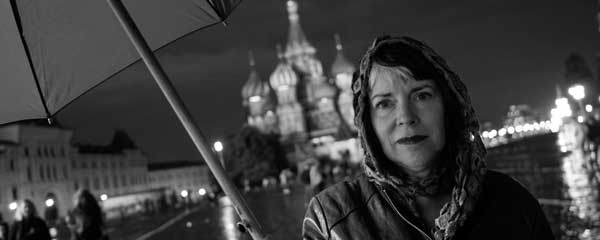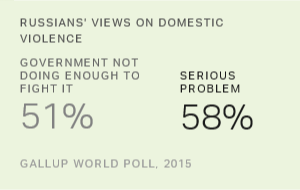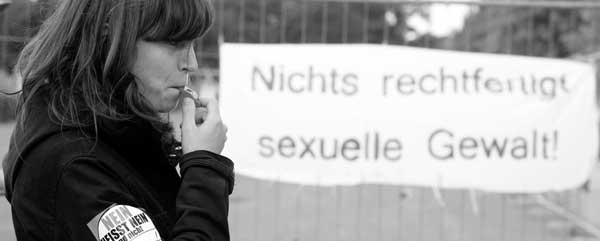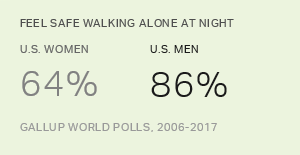
A conversation with Neli Esipova
Gallup's Regional Director for the World Poll in former Soviet states and Eastern Europe
Last International Women's Day, you talked about how women in your region must juggle raising children, taking care of the family and working -- and, on top of that, some of them are being beaten.
What is the situation like now, after Russia decriminalized some forms of domestic abuse in 2017?
Esipova: If you look at the official statistics, the number of domestic violence cases reported to the police in 2017 dropped by half. This isn't because it's not happening. Most likely, women see no reason now to report it because nobody will do anything. They understand it is useless. Their abusers cannot get sentenced -- they pay a fine, or the maximum jail time they serve is two weeks.
If anything, abuse has increased. One of my friends, Marina Pisklakova-Parker, runs an NGO that helps victims of domestic abuse in Russia. She says her help lines received 20,000 calls in 2016 and 27,000 calls in 2017.
But despite the negative effect on women, there have been some positives. Because of the law, more people are talking about domestic violence. The media attention has helped give people a better understanding of the situation.
What about respect in this climate? Do women in the region feel they are respected and treated with dignity? How do men feel women are treated?
Esipova: Clearly in a lot of countries in my region, there is a gap between men and women on this question. Although in many countries it is still a majority, women are most often less likely than men to say yes. In Russia for example, 72% of men say women in Russia are treated with respect and dignity, while 59% of women feel this way.
| Men | Women | Gender gap | |||||||||||||||||||||||||||||||||||||||||||||||||||||||||||||||||||||||||||||||||||||||||||||||||
|---|---|---|---|---|---|---|---|---|---|---|---|---|---|---|---|---|---|---|---|---|---|---|---|---|---|---|---|---|---|---|---|---|---|---|---|---|---|---|---|---|---|---|---|---|---|---|---|---|---|---|---|---|---|---|---|---|---|---|---|---|---|---|---|---|---|---|---|---|---|---|---|---|---|---|---|---|---|---|---|---|---|---|---|---|---|---|---|---|---|---|---|---|---|---|---|---|---|---|---|
| % Yes | % Yes | pct. pts. | |||||||||||||||||||||||||||||||||||||||||||||||||||||||||||||||||||||||||||||||||||||||||||||||||
| Lithuania | 79 | 51 | -28 | ||||||||||||||||||||||||||||||||||||||||||||||||||||||||||||||||||||||||||||||||||||||||||||||||
| Georgia | 73 | 51 | -22 | ||||||||||||||||||||||||||||||||||||||||||||||||||||||||||||||||||||||||||||||||||||||||||||||||
| Moldova | 62 | 42 | -20 | ||||||||||||||||||||||||||||||||||||||||||||||||||||||||||||||||||||||||||||||||||||||||||||||||
| Russia | 72 | 59 | -13 | ||||||||||||||||||||||||||||||||||||||||||||||||||||||||||||||||||||||||||||||||||||||||||||||||
| Latvia | 74 | 61 | -13 | ||||||||||||||||||||||||||||||||||||||||||||||||||||||||||||||||||||||||||||||||||||||||||||||||
| Armenia | 85 | 73 | -12 | ||||||||||||||||||||||||||||||||||||||||||||||||||||||||||||||||||||||||||||||||||||||||||||||||
| Kazakhstan | 84 | 73 | -11 | ||||||||||||||||||||||||||||||||||||||||||||||||||||||||||||||||||||||||||||||||||||||||||||||||
| Ukraine | 66 | 55 | -11 | ||||||||||||||||||||||||||||||||||||||||||||||||||||||||||||||||||||||||||||||||||||||||||||||||
| Belarus | 77 | 68 | -9 | ||||||||||||||||||||||||||||||||||||||||||||||||||||||||||||||||||||||||||||||||||||||||||||||||
| Estonia | 82 | 73 | -9 | ||||||||||||||||||||||||||||||||||||||||||||||||||||||||||||||||||||||||||||||||||||||||||||||||
| Kyrgyzstan | 78 | 70 | -8 | ||||||||||||||||||||||||||||||||||||||||||||||||||||||||||||||||||||||||||||||||||||||||||||||||
| Uzbekistan | 98 | 97 | -1 | ||||||||||||||||||||||||||||||||||||||||||||||||||||||||||||||||||||||||||||||||||||||||||||||||
| Azerbaijan | 89 | 90 | +1 | ||||||||||||||||||||||||||||||||||||||||||||||||||||||||||||||||||||||||||||||||||||||||||||||||
| Turkmenistan | 75 | 83 | +8 | ||||||||||||||||||||||||||||||||||||||||||||||||||||||||||||||||||||||||||||||||||||||||||||||||
| 优蜜传媒World Poll, 2018 | |||||||||||||||||||||||||||||||||||||||||||||||||||||||||||||||||||||||||||||||||||||||||||||||||||
I think this gap in some ways reflects the fact that women in Soviet days were given equality that was not given to women in many other parts of the world. Well, this equality didn't manifest itself in all areas of life, but it did in two areas: education and participation in the workforce.
But even then, a woman could work full time and still be expected to take care of the home and the children. We lived in a macho society where men were considered the breadwinners. The same is true today in many families. I think men may think of women's access to education and employment and believe that women have all rights already. But women are not paid equally to men; it is harder for them to get executive positions at work.
Tell me about any of the positive changes you are seeing for women in your region. Tell me what gives you hope.
Esipova: Yes. Things are changing. Younger generations' perceptions are different. If you talk to younger men, many of them see how important it is for men to participate in raising children. Among older generations -- particularly in rural areas -- you still see the traditional attitudes.
Also, it's too early to say what positives may emerge from it, but Russia did sign on to the National Action Strategy for Women. This attempts to move the needle on women's rights in several areas, including women in the labor market, political participation of women and violence against women.
Do you have any stories or examples from your work in these countries that you can share that illustrate how things are getting better for women?
Esipova: Maybe not an example of how things are getting better, but more of an illustration of how it is. For example, there was a professional couple -- a highly educated husband and wife with three kids. Both spouses had demanding full-time jobs. The wife took care of the kids, the house -- all the domestic stuff -- and her husband did not help her.
When she confronted her husband about it, he said to her, "You are just making money. I'm having a career."
Read more stories about women around the world on our International Women's Day page.



